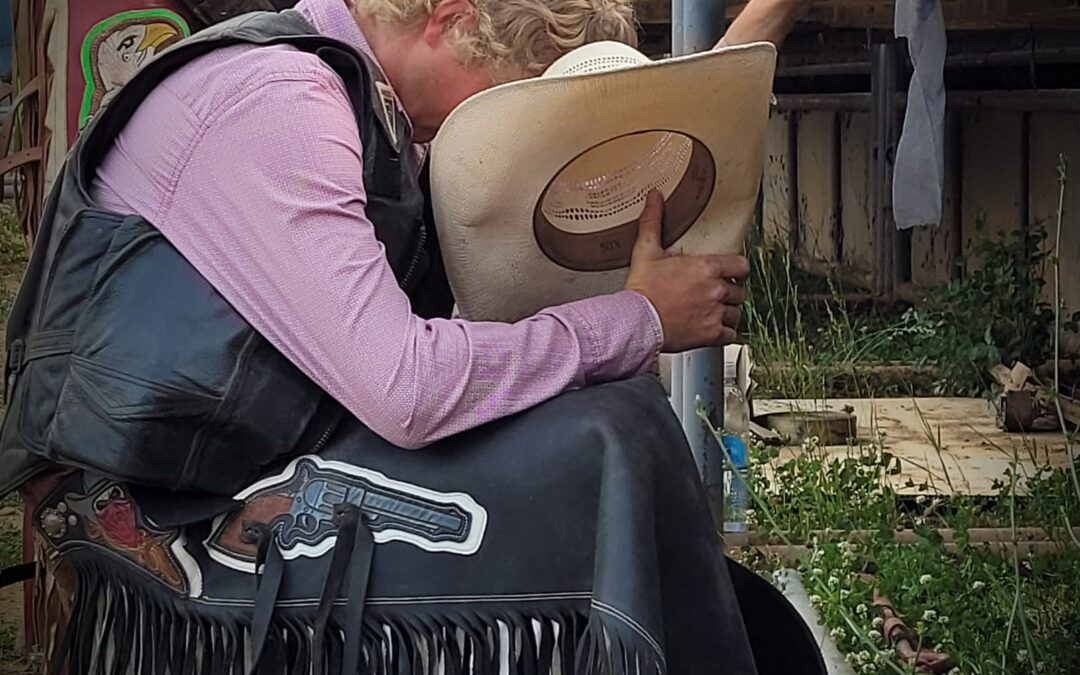
by admin | Jun 30, 2022 | Behind the Bucking Chutes, The Company You Keep
Part 6 of 7 The Company You Keep
By Scott Hilgendorff / Cowboys of the Cross
Just like bull riders will tell you that to get better, you want to be surrounded by better bull riders, we know that the Bible teaches us there are times we have to be careful who we tie ourselves to. If we spend all our time with unbelievers, we can see our own faith suffer. At the same time, we have to spend time with unbelievers in order to share the gospel with them—how to be saved from the punishment meant for our sin by a belief in Jesus Christ, repenting of our sin and asking to be forgiven.
But before we can worry about finding the balances there, we first need to become disciples.
John 8:31-32 So Jesus said to the Jews who had believed in Him, “If you abide in my word, you are truly my disciples, and you will know the truth, and the truth will set you free.”
Jesus tells us that when we have truly become a Christian—a follower of Jesus—then we will ‘abide’ in his word. That means that we will live it out. Our desire to do that is the proof of our salvation.
While there is a lot to being a disciple that the average Christian seems to ignore throughout the New Testament, we know that in its simple form, a disciple is someone who follows Jesus.
In rodeo, most of us have successful cowboys and bull riders who we follow to learn their style, techniques and how they became successful.
Jesus tells us that we will live out his word but he knows we don’t immediately know or understand everything there is in the Bible.
That’s why, even though Jesus calls us disciples, we still need to be discipled.
The Great Commission in Matthew 28:19-20 tells his disciples to go into the world and make make more disciples with clear instructions to teach others about what Jesus taught them. That means right now, there are people out there with knowledge and wisdom we haven’t achieved yet who are following, or should be following, the command to make disciples. There are people we need to have teaching us what they know from the Bible.
At the same time, we read our Bibles on our own, attend church services, learn where we can and pray in order to learn and put to practice what it means to live out our faith.
And Jesus tells us it isn’t going to be easy.
Luke 9:23 And he said to all, “If anyone would come after me, let him deny himself and take up his cross daily and follow me.
There can be a cost to following Jesus and while there is much we can study on being disciples and what it means to follow Jesus, we’re focused right now on making sure we have the right people in our lives to be successful followers of Christ.
By linking with other believers who are more mature and experienced in their faith than we are, we can be discipled by them while we also begin the process of teaching others about Jesus. As we learn, we teach, regardless of how experienced we are. If I’ve just started learning how to throw a rope and you teach me a better way to guide my loop to the roping dummy’s head, it doesn’t matter whether I’ve won a rodeo or even entered one; once you’ve taught me how to do that much, I can teach someone else that much too.
(Supporting photo of the Bible provided by John-Mark Smith of Lviv, Ukraine)

by admin | May 4, 2022 | The Company You Keep
Part 2 of 7 The Company You Keep
By Scott Hilgendorff / Cowboys of the Cross
“If you want to be successful, surround yourself with successful people.”
Quotes like this are common among the rodeo crowd and they are embraced by competitors because of that desire to succeed and get ahead.
It makes sense.
If you spend more time with competitors who are better than you, you might learn something from their attitude, skills or way of living that helps you to also succeed or become a better bull rider, barrel racer, roper or horseman.
It’s like this in Proverbs 27:17 Iron sharpens iron, and one man sharpens another.
This is a common verse many people can quote and often not realize that it even comes from Scripture. It’s point is simple: we can help make each other more effective.
But when it’s coming from the Bible we understand it’s referring to Christians. Another Christian friend can help me be more effective in my faith and I can help him to be more effective tool.
Conversations about the Bible and living out our faith with each other help us to be ‘sharper’ believers.
And we’re encouraged throughout Scripture to spend time together as believers from when the church first started in the historical account we seen in Acts to to the letters Paul writes to different churches as he tries to encourage them or confront conflicts he has learned about within their communities.
Hebrews 10 24-25 And let us consider how we may spur one another on toward love and good deeds, 25 not giving up meeting together, as some are in the habit of doing, but encouraging one another—and all the more as you see the Day approaching.
Paul is telling church they need to encourage one another to show love and do good and to encourage one another as if we are near the very end. If we knew for sure these were the last days before Jesus came back, we would be rushing to make sure others knew who Jesus was. Paul is telling the people in the church to encourage each other and live as if that day was almost here.
Again, what we’re seeing is a push toward working together to do a better at living our our faith.
He tells the church at Colossae that we are to work together as well.
Colossians 3:16 Let the word of Christ dwell in you richly, teaching and admonishing one another in all wisdom, singing psalms and hymns and spiritual songs, with thankfulness in your hearts to God.
We’re to teach and correct each other while worshiping God together so that the teachings of Jesus would become a big part of who we are.
Just like the Bible warns us not to be unequally yoked with unbelievers who will wear us down and weaken our faith, we see that by being connected together with believers, our faith will be strengthened and better equipped to share that faith with others.
We seem to understand this idea outside of the Bible when it comes to wanting to be better competitors and seeking personal success. We don’t realize or overlook how much a similar teaching is is commanded through Scripture to be connected to other believers with the focus being on our becoming stronger in our faith and able to lead others to Jesus.

by admin | Dec 12, 2021 | Strengthening Your Grip
By Jesse Horton / Cowboys of the Cross
One of the greatest plagues of Western Christianity is that so many who profess the name of Christ remain in perpetual spiritual infancy, and that many “Christian infants” are not following Christ at all, but simply wanted the fire insurance that is promised to those who belong to Jesus.
That’s why so often, you see one of the few, or even only times, you see a cowboy or bull rider pray is behind the bucking chutes before competing in sports that can get him killed.
As a retired bull rider now pastoring a church, when I started with them, I made it clear that my ministry would be focused on leading our congregation to pursue a mature faith in Jesus Christ as true disciples. One of the deacons told me he felt like that was a bold (maybe risky) way to approach what was essentially a job interview – to begin by suggesting we’ve been lax in pursuing maturity, content to be comforted with bottled milk and pacifiers rather than to graduate to the strength-giving meat and potatoes of a deep and growing dependence on Jesus. But, what else can you expect from a guy who spent ten years of his life riding bulls?!
But hard questions are important. Are you growing in your faith? Do you even care if you aren’t? Have you become satisfied with a little bit of Bible knowledge and a little bit of doctrinal understanding?
Satisfied. That’s where the audience of Hebrews was.
11 About this we have much to say, and it is hard to explain, since you have become dull of hearing. 12 For though by this time you ought to be teachers, you need someone to teach you again the basic principles of the oracles of God. You need milk, not solid food, 13 for everyone who lives on milk is unskilled in the word of righteousness, since he is a child. 14 But solid food is for the mature, for those who have their powers of discernment trained by constant practice to distinguish good from evil. (Hebrews 5:11-14)
These people had heard the message of true discipleship so many times without acting on it that their ears had become dull, and their hearts had become calloused to it. It was time for them to be shaken awake in hopes that the scales would fall from their eyes, and they would realize the great reward of knowing Jesus – a reward that they were forfeiting by their complacency.
1 So put away all malice and all deceit and hypocrisy and envy and all slander. 2 Like newborn infants, long for the pure spiritual milk, that by it you may grow up into salvation— 3 if indeed you have tasted that the Lord is good.
4 As you come to him, a living stone rejected by men but in the sight of God chosen and precious, 5 you yourselves like living stones are being built up as a spiritual house, to be a holy priesthood, to offer spiritual sacrifices acceptable to God through Jesus Christ. (1 Peter 2:1-5)
Notice here that Peter suggests that those who don’t “grow up into salvation” have not truly “tasted that the Lord is good.” You see, salvation is achieved at a moment in time when we truly believe (known as justification) but it is proved over time (from the moment of our justification to the moment we are home with Jesus, called sanctification). If there is no sanctification – a constantly continuing work throughout our entire lives – there was no justification either; and if there was no justification, there is no salvation!
Are you being built up as a spiritual house with your brothers and sisters in Christ? Together, are you becoming a holy priesthood – those who lead others into a relationship with God through Jesus Christ? Are you offering spiritual sacrifices? Are you eager and zealous to know Jesus more deeply today than yesterday and to become more like him tomorrow than you are today? Many people get offended or become defensive and deny the evidence when these types of questions are asked. Please remember: the grace of Jesus has freed you from the need to do that! All your shortcomings are covered by the blood of Jesus, so in Christ, you are free to be brutally honest about where you are right now. And what’s even better is that same grace is what will continue the work of God in you – not your own efforts! And that grace can be released to do its work when you get honest with God. “And I am sure of this, that he who began a good work in you will bring it to completion at the day of Jesus Christ” (Philippians 1:6).
Beloved, God’s work in you is not done yet, nor is it done in me. We are free to struggle with sin and failure, but we do not struggle to be free. And if indeed we have been set free, there is still growth ahead.
Are you growing in your faith?

by admin | Oct 7, 2021 | Strengthening Your Grip
By Jesse Horton / Cowboys of the Cross
Back in my bull riding days I was a regular at a weekly event that a small association sponsored from April thru October each year. A few times, they chose to do a bull riding clinic. It was an opportunity for the more experienced riders of the association to spend some time with the new guys who were eager to learn and advance their skills in the sport. Participants usually had the opportunity to get on five bulls throughout the day and get some feedback on their rides, learn how to avoid common mistakes and receive encouragement to always fight to move toward the “sweet spot” with each jump and kick. We usually didn’t have paid bullfighters at these events, so the instructors would step in and do what they could to give riders a reasonable opportunity to get up and get out of the way after they came off their bulls.
At one of these clinics, a young rider was thrown early in his ride. When he hit the ground – not so hard – he laid there; he looked up to see that the bull wasn’t coming back for him, then he laid his head down. At this point, I sat everyone down and made this comment: “There are no bullfighters here. We (the instructors) will make one pass to get the bull’s attention and give you time to get up and get out of the arena. If you decide to lay there and get stomped and hooked, that’s on you. The only valid excuses for lying there after you buck off are paralysis or unconsciousness.” I was pretty mad because his thoughtlessness and inaction put me and others at risk unnecessarily.
It really is difficult to do life with other people. Sin not only created a rift in our relationship with God, but it has also caused brokenness in our bonds with one another. We all have our own ideas about how things should or shouldn’t be done, and we tend to value our own lives and opinions over those of others. That’s why when we come together as a group it’s beneficial to have some kind of understanding of what we can expect from one another. My son is a Boy Scout. At every meeting, scouts recite the Scout Oath and the Scout Law. These recitations remind them of who they are called to be and what is expected of them as scouts. If you are found in breach of these expectations, you may be dismissed as a member. The U.S. Armed Forces, the Masonic Lodge, the Ruritans, and most other groups all have expectations and for the good of the group and its missions, will all dismiss those who don’t follow those expectations.
The Church is no different. Yes, there is grace for when we fail – and we will fail, but there is a call on our lives to be true disciples of Jesus and expectations that go along with that call. In Philippians 2:3-4, the Apostle Paul, encouraging unity and harmony among the Philippian believers writes, “Do nothing from selfish ambition or conceit, but in humility count others more significant than yourselves. Let each of you look not only to his own interests, but also to the interests of others.” He goes on to acknowledge how Jesus, though he had the full authority of God being equal with the Father, emptied himself of his own glory to become a servant of sinful human beings. You and I are not so important that we should expect to have our own expectations fulfilled by the group. In fact, the group’s mission should define our expectations.
So, what are the expectations of a group who professes to follow Jesus Christ as his disciples? There are many, but it begins with the commitment to follow Jesus. That commitment is defined by Jesus in Luke 9:23: “If anyone would come after me, he must deny himself, take up his cross daily, and follow me.” That means my desires give way to Jesus’ mission. My life is no longer mine, but his to do with as he pleases.
That commitment has implications for how we do life together in Jesus’ Church as well. I encourage you to read Ephesians 4-6 now to see how Paul elaborates on this topic. He calls us to humility, gentleness, and patience “bearing with one another in love, eager to maintain the unity of the Spirit in the bond of peace” (4:2-3). He calls us to put away falsehood and speak the truth with one another, and sometimes truth is difficult to accept when we have been deceived. He calls us to deal with our anger quickly and apart from sin rather than letting things fester and sour our relationships with one another. He commands the thief to stop stealing and work with his hands so that he’ll have something to contribute to those who are truly in need. He commands our speech to be only that which encourages and strengthens one another, not the kind of speech that slanders and demeans. We are to reject bitterness, wrath, anger, clamor, slander, and malice as necessary evils in our relationships with one another. Instead, we should be kind, tenderhearted, and forgiving. Why? Because God has forgiven us for our sin against him, so we have no valid reason to withhold forgiveness from others – we are not God!
It is time for us to embrace God’s mission for us as individuals and for us as a body of believers. We can either embrace a lifestyle of complaint or one of gratitude. One will divide. The other will unify. One will create discontentment. The other will cause us to receive the peace of God that surpasses all understanding. Won’t you join me in pursuing peace by embracing the biblical role and the expectations of a disciple of Jesus?

by admin | Jul 15, 2021 | Behind the Bucking Chutes
By Scott Hilgendorff / Cowboys of the Cross
Peace is a Fruit of the Spirit outlined in Galatians and is something that grows in us as our faith grows. To experience peace is to understand that God is in control. Our focus needs to be on Him and our knowledge that everything works out for His glory, even if it isn’t working out the way we want.
To not recognize God is in control or to put our own desires first, can lead us to a place of worry and even fear. How do we make a truck payment if we just spent $60 in entry fees and all our money on gas to and from the rodeo and bucked off?
Our peace comes from understanding what it means to have a saving faith in Jesus. We rest in the trust and comfort that God has saved us from the punishment meant for our sins and given us an eternity with Him in Heaven where there will be absolutely nothing to worry about.
Worry can mess with your heads and continue to add to the pressures that contribute to bucking off, not catching a calf or damaging our relationships. Many worry that an injury might not heal right and that their careers could be over. We worry about our family, our relationships, a doctor’s appointment for a recurring pain in our stomach.
As the fruit of peace grows in us as we continue to grow in our faith and become more like Christ, our reasons for worrying diminish and we learn to trust in God who, through Jesus, tells us in Matthew 6:25-34
“Therefore I tell you, do not be anxious about your life, what you will eat or what you will drink, nor about your body, what you will put on. Is not life more than food, and the body more than clothing? 26 Look at the birds of the air: they neither sow nor reap nor gather into barns, and yet your heavenly Father feeds them. Are you not of more value than they?27 And which of you by being anxious can add a single hour to his span of life? …33 But seek first the kingdom of God and his righteousness, and all these things will be added to you. 34 “Therefore do not be anxious about tomorrow, for tomorrow will be anxious for itself. Sufficient for the day is its own trouble.
Jesus throughout the whole section of Scripture, describes in detail how well God cares for all His creation but emphasizes that we are the most valuable part and have a purpose.
God has put in front of us whatever it is He wants us to do or deal with today. From the verses in Matthew, we know God wants us to trust Him. Even when things aren’t going according to our plans, they are working for His good. Always. He will take care of what is coming tomorrow, we just have to face what is in front of us today.





Recent Comments